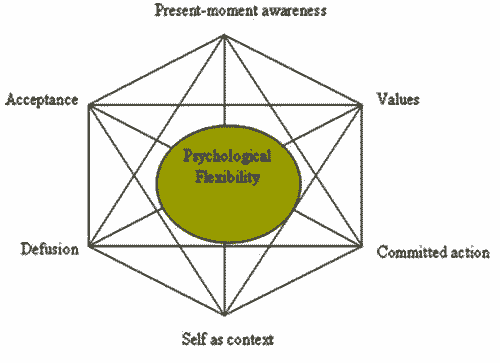Psychological flexibility is an important aspect of overall mental health. Psychological Flexibility is defined as, ” “contacting the present moment fully as a conscious human being, and based on what the situation affords, changing or persisting in behavior in the service of chosen values” (Working with ACT, 2017).
The reason psychological flexibility is important is because lack of psychological flexibility can be a contributing factor to certain mental health issues, such as anxiety, depression or substance abuse. It correlates with “Mindfulness” which is a technique used in certain therapies such as CBT (Cognitive-Behavioral Therapy). This is the main psychological method used to treat Depression and Anxiety.
Mindfulness means being in touch with the present moment and putting your focus on your immediate surroundings. Similarly, to psychological flexibility it emphasizes being immersed in the present moment. This is important because during times of anxiety such as panic attacks, or depression such as – a major depressive episode, people tend to not be fully engaged in the present moment. Either they are focused on their past or concerned with their future. The goal of mindfulness therapy or having high psychological flexibility would be to engage an individuals focus on the present moment. By doing this, this person will feel less overwhelmed and feel more “grounded”. This method is also used in those who suffer from PTSD and are experiencing flashbacks. These can be traumatic and terrifying moments for people, by being taught psychological flexibility or using mindfulness it can help them gain control of the situation and feel more secure.
However, another aspect with psychological flexibility is being able to adapt to the changing of events, people and desires. It means that you are able to being a fresh perspective of situations even if they may be rapidly changing. This is important because many people with personality disorders and other mental health issues have an “enduring pattern of behaviour” this enduring pattern of behaviour is what causes the dysfunction. It is because they have trouble adapting regardless or situation, context or environment.
Psychological flexibility is important and allows us not be become overwhelmed by our fluctuating desires and emotions. It is definitely not always easy, and no one is perfect in this respect. However, it is something that people can work on to maintain or improve.
The diagram above shows a theoretical example of an individual’s sense of self.
- Ones present moment of awareness being full engaged with that is happening.
- Maintaining your values within this context
- Accepting what you cannot change
- Defusion of conflict or negative impulses
- Committed action to the present day context
- And who you are within this context.
Your psychological flexibility can be measured using a questionnaire termed, Acceptance and Action Questionnaire (AAQ 2).












